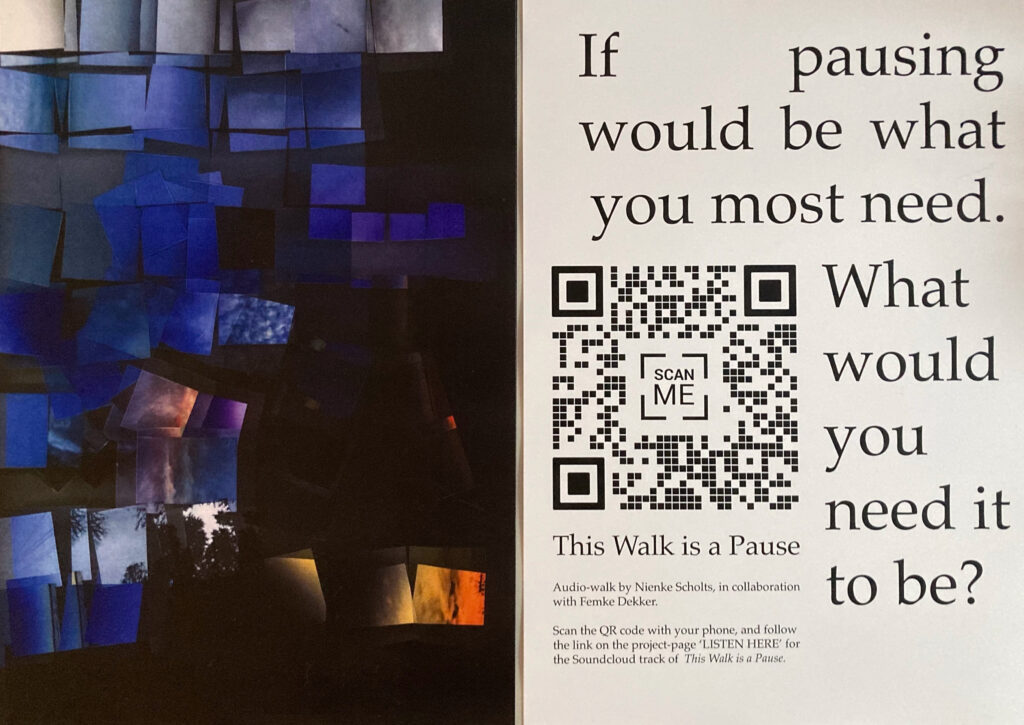What:
Audio walk
When:
When in need for a pause
Where:
Wherever your feet take you
Duration:
50 min (or a longer while)
“I started walking in Scotland, in Japan. Or was it an island closer to home; Terschelling, my dreams? I started walking at the age of 2, in the living room, the backyard. Never liked it as a child, always wanted to be carried. Somewhere along the way I started to enjoy walking. The exact point is a forgotten moment of crucial change. I started walking as part of my artistic practice in the Finnish countryside and pine forests of mid-winter, dark at first glance, so colourful inside. I started walking when I had to stay home. Every morning and afternoon, while the world slowed down. I started walking when I got burned-out, trying to remind my body how to relax, how to be restful: how to pause.
This walk is a pause.
This pause is a walk.”
This Walk is a Pause is a poetic sound piece in which the narrator invites the listener to walk along with her through both actual and mental landscapes – Finnish pine forests, fields of exhaustion, tingling brain gums, the neighborhood, experiences of disorientation and comforting darkness – eventually arriving in a surrounding where walking offers a form of pausing.
Exploring walking as a pausing practice, this piece asks which potential space might open if one steps aside from given pathways for a shorter or longer while: If pausing would be what you most need, what would you need it to be?
Credits
This Walk is a Pause, is a work in development, and part of an ongoing research into dramaturgies of work and practices of pausing.
Responses to -and experiences of -this audio walk by listeners are gratefully welcomed at: nienkescholts@gmail.com.
Feel free to share the track with others. Instagram: @nienkescholts – please use #thiswalkisapause.
Text and concept of this piece:
Nienke Scholts
Sound design: Femke Dekker

Practices of organising performing arts evolve from the doings of artists and institutions that actively and radically re-invent how they work. Understood as practice, organising becomes an activity that matters who is doing it and how. This is not informed by pre-existing organisation models, but rather by the values and beliefs the people doing the organising wish to prioritise, and the attitudes and choices that result from that.
Through this research I intend to articulate and stimulate ‘new’ practices of organising performing arts, and I do this from within. Being part of the local performing arts scene that I look at, I decided to shape my research through the continuation of my artistic practice, and made my collaborations (Veem House, MOHA, Platform-Scenography) the subject of my study. By co-developing and mapping inspiring ways of organizing performing arts, I intend to make the knowledge they produce, performable and liveable for a larger field of people that are trying to change their ways.
Using the practice of dramaturgy, I am interested in finding modes of organising artistic work that move from the condition of precariousness into more sustainable ways that are based on interdependency. As ‘we are the weavers, and we are the woven’ (I. Stengers), we are also responsible for what we today realise to be ‘weaving-flaws’ in the systems underlying our ways of being. We depend on each other for unravelling and repairing these, or weaving new patterns all together.


